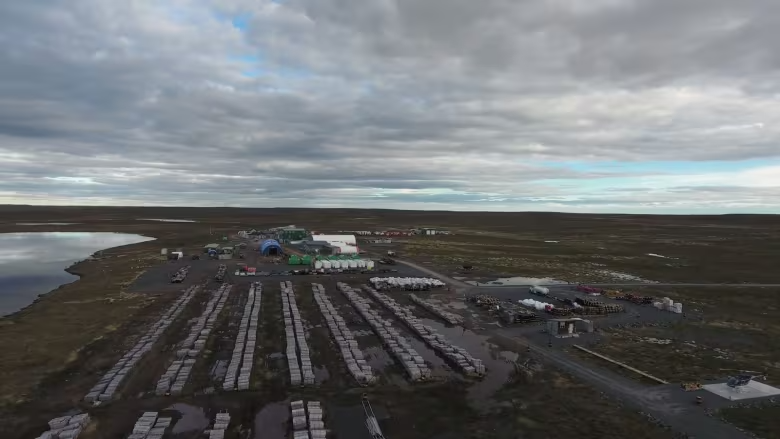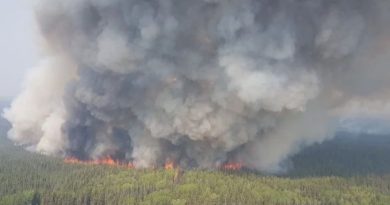Review board recommends wind farm at western Nunavut mine be approved

B2Gold’s proposal includes 13 wind turbines on the Back River gold mine
A wind farm could be coming to a mine in the Kitikmeot region if a federal minister accepts recommendations from the Nunavut Impact Review Board.
The review board is recommending a proposal from mining company B2Gold to build what they’re calling the Back River Energy Centre on its Back River gold mine about 400 kilometres southwest of Cambridge Bay, be approved.
The board said the project should only be allowed to proceed with specific revisions to its project certificate, “to enhance various aspects of project monitoring, mitigation, and adaptive management planning.”
If approved, the project would add 13 wind turbine generators, a solar array and a battery energy storage system. The company says those changes would reduce fuel use on the mine by approximately 50 per cent.
The turbines would be 180 metres high and spaced 500 metres apart. The energy storage system would be 400 metres by 400 metres and include 10 12-metre sea cans and a solar array that’s 200 metres by 400 metres.

In community consultations on the project, residents of Kitikmeot communities raised concerns over potential impact the wind turbines could have on wildlife.
“[I]t’s our way of life, our food,” Barnaby Immingark, a resident of Kugaaruk is quoted as saying in a NIRB document summarizing its recommendations.
“From the time I was born, my parents harvested, my grandparents harvested. And still today we join the harvest. So any change, sudden changes will do some changes to our migrating animals.”
Residents said they worried the light and vibrations from the wind turbines would impact caribou migrations. They similarly raised concerns about birds colliding with wiring of the turbines and birds making their nests in them.
“The wind turbines are going to be at a great height. I think for sure that that’s going to cause a problem for migratory birds,” Joe Ashevak from Taloyoak is quoted as saying in the same report.
‘Widespread community support’
In its recommendation, NIRB noted that during the assessment, there was also “widespread community support for the environmental and socio-economic benefits” that could result from the project.
“The potential for the proposal to have negative effects on people and terrestrial wildlife such as caribou, birds, etc. are limited,” NIRB said in a news release. “Consequently, the board views the proposal as well-suited to provide a test case of how alternative energy sources can be developed and used in an Arctic environment.”
B2Gold said the noise from the turbines would be barely louder than a whisper, and that the towers will be temporarily shut down during peak bird migration and during “sensitive seasons” when caribou are nearby.
It also said that officials would monitor whether the project does impact caribou behaviours and bird mortalities.
Tara Arko, NIRB’s director of operations, said that monitoring would be shared by regulators and exact roles would be more clearly defined if the proposal is approved.
B2Gold declined an interview until after there is a decision on its proposal and instead sent an email statement from President and CEO Clive Johnson.
“The company remains committed to developing the Back River Gold District in an environmentally and socially responsible manner, and the Back River Renewable Energy Centre is a key part of making this happen, should it be approved.”
Late last year, NIRB rejected a proposal to extend Agnico Eagle’s Meliadine gold mine near Rankin Inlet and 11 wind turbines, citing community concerns over how the changes would affect caribou.
NIRB has provided its recommendation to federal Northern Affairs Minister Daniel Vandal, who has the final say on whether the project is approved.
The minister has until mid-July to either accept or reject the proposal.
Related stories from around the North:
Canada: Tarquti Energy, Hydro-Quebec deal important step towards green energy for Nunavik, Inuit leaders say, Eye on the Arctic
Finland: Lapland among regions not in favour of wind power compensation for eastern Finland, Yle News
Norway: Will the green transition be the new economic motor in the Arctic?, Eye on the Arctic
Sweden: Wind farm delays in northern Sweden could hinder green revolution, Radio Sweden
United States: Alaska’s Northwest Arctic Borough gets $2 million tribal energy grant, Alaska Public Media



